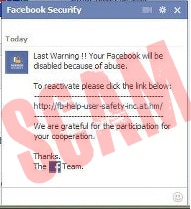5 Facebook scams you need to watch out for in 2017
Facebook is a hotbed for any number of scams that social networkers need to be on the constant lookout for.
Scammers are always coming up with news traps or changing older scams in a bid to catch out unwary victims. Here are five such scams that have been popular during 2017.
5. Like and share this post to win! (coupled with advance fee fraud)
Everyone on Facebook has more than likely seen a Facebook post that claimed you could win some expensive prize (like a ‘Luxury RV’, free airline tickets or a Disney cruise) just for liking and sharing the post and following a page.
Those scams are everywhere. Most of them trick you into following ‘like-farming’ Facebook pages or some may even lure you to spammy marketing webpages that want all your personal information so they can spam you relentlessly.
However many of these fake competition scams have taken a more sinister turn by tricking those who do like and share their posts into handing over money to get their “prize” delivered to them. Only, of course, the prize doesn’t really exist.
Facebook users who like and share one of these spammy posts are contacted by the page, which claims that they’ve won the prize. But first they need to cough up money for things like “shipping costs” or “handling fees”.
Don’t worry, the Facebook page says, since the prize will more than reimburse the Facebook user for their woes. However, in reality the prize doesn’t exist, and when the Facebook user opens their wallet and pays, the crooks take the money and run.
You’re not going to win expensive goods for just liking and sharing a post. Only interact with competition posts from known and trusted brands with websites, contact information and a good reputation!
Sponsored Content. Continued below...
4. Your Account is going to be Disabled
These phishing scams have been around for years but have always remained a successful way of scamming victims due to their increasingly convincing appearance.
A Facebook user gets a message – through email or through Facebook Messenger – from what appears to be from Facebook. They are told they’re account is going to be disabled for a violation, unless they click a link, login and confirm their details.
However the user hasn’t been contacted by Facebook. It’s a scammer pretending to be Facebook, and the link leads to a spoof webpage designed to look like the Facebook login page. The user enters their login information, and that information gets sent to a scammer.
It’s a phishing scam. The crooks want your Facebook login information so they can take control of your Facebook account. Remember to always check the web address of a login page to make sure it actually belongs to Facebook, and consider enabling login approvals so criminals need more than just your password to access your Facebook account.
3. Is this you in this video?
This is another phishing scam that works very much in the same way as the above scam. However in this case the victim receives a message from a friend over Facebook (that friend has had their account compromised) that says something like “Is this you in this video?”.
The link appears to lead to a video sharing site like YouTube. However once again this is actually leading to a spoof webpage designed to trick you into handing over your Facebook login information. Alternatives to these scams actually try and trick victims into downloading a “video codec” to see the video which actually turns out to be malware.
Sponsored Content. Continued below...
2. Work-From-Home with Facebook!
2017 has seen a massive surge of scams claiming you can work from home using some sort of “legal loophole”. Many of these scams are using Facebook’s “sponsored posts” to advertse themselves, and Facebook seem to be doing very little to curb this trend.
These posts will appear in your newsfeed and link to a variety of different work-from-home scams, including get rich quick scams that claim you can get rich using Binary Options.
They are all scams, and remember, just because Facebook are “sponsoring” a post, it doesn’t mean it isn’t a scam.
1. Facebook Cloning scams
Facebook cloning is on the rise. Despite many misleading warnings, it’s not happening to “almost all accounts”, but it’s still something to look out for.
Facebook cloning is when crooks set up a duplicate ‘clone’ account to yours (by copying your name, profile picture and any other information they can glean from your account) to try and trick your friends into thinking they are you, and accept a friend request.
These scams are usually trying to trick your friends into sending “you” money. Only it’s not you, it’s the cloning crook.
Protect your friends from this scam and hide your friends list. This way a crook won’t know who you’re friends with. Read more about these cloning scams here.
Keep up-to-date with all the latest cybersecurity threats and our tips to stay safe online. Follow us on Facebook, Instagram and Twitter.
Continued below...
Thanks for reading! But before you go… as part of our latest series of articles on how to earn a little extra cash using the Internet (without getting scammed) we have been looking into how you can earn gift vouchers (like Amazon vouchers) using reward-per-action websites such as SwagBucks. If you are interested we even have our own sign-up code to get you started. Want to learn more? We discuss it here. (Or you can just sign-up here and use code Nonsense70SB when registering.)
Become a Facebook Supporter. For 0.99p (~$1.30) a month you can become a Facebook fan, meaning you get an optional Supporter Badge when you comment on our Facebook posts, as well as discounts on our merchandise. You can subscribe here (cancel anytime.)




